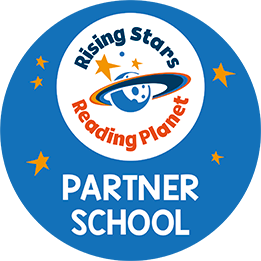
English
Reading
“The overarching aim for English in the national curriculum is to promote high standards of language and literacy by equipping pupils with a strong command of the spoken and written language, and to develop their love of literature through widespread reading for enjoyment.” (DfE 2013)
“Reading for pleasure is the single best indicator of a child’s academic success.” (OECD)
Our reading approach is designed to enable all pupils to develop a love of reading through rich and lively reading experiences so that they become successful life-long readers. We strive to provide an engaging reading experience, which immerses the children in their learning and fosters a love for reading, a passion for discovery and confidence to explore the world around them. Success as a reader underpins learning in all areas of the curriculum and wider life and therefore is highly valued and prioritised in our school.
We encourage all children to experience and enjoy a wide range of diverse texts. This incudes online e-books, webpages and articles or poems as well as high quality printed books and magazines. In KS2 we hold an after school reading club to share and recommend books with each other. We also have a weekly Brittanica Magazine club which culminates in an annual Cross-Trust reading quiz!
Book buddies allow younger children to share their love of reading with older pupils, including secondary pupils from Shireland Collegiate Academy.
Story Escape: Developing a love for reading!
Reading starts with sharing and enjoying stories. We share and enjoy books together and emphasise the importance of books in enabling children to become confident, happy and enthusiastic readers and writers, with all the benefits this brings from the earliest age.
To further develop that “love of stories” there will be dedicated time every day from Early Years to Year 6 where teachers will share and read a story, modelling how to read expressively and prompting curiosity and wonder. We have a carefully chosen spine of literature with a diverse range of books and authors that children share and enjoy in each year group in addition to texts that teachers select. Language and vocabulary are key, and children are encouraged to play with language, discuss authorial word choices and learn new words to enrich their web of vocabulary.
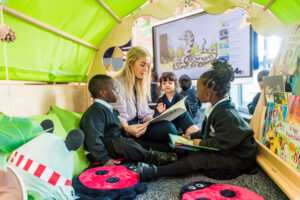
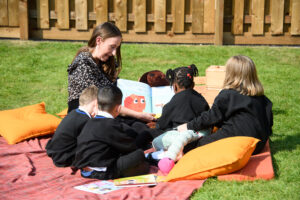
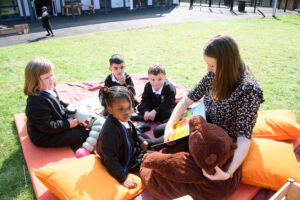
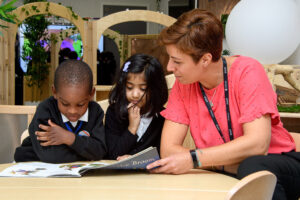
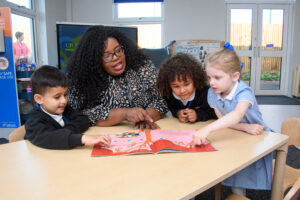
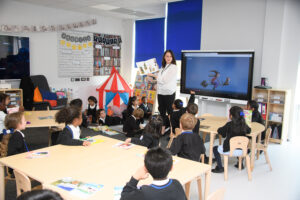
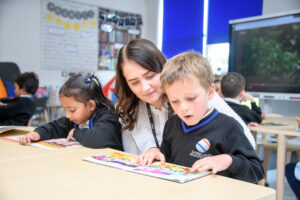
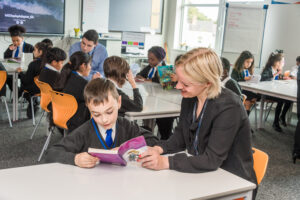
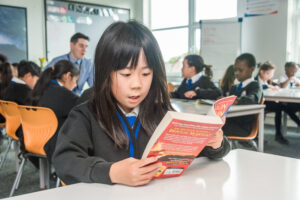
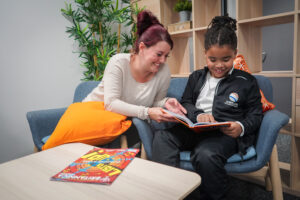
Phonics
We prioritise the development of early reading by putting reading at the heart of everything we do. Through the use of robust and systematic teaching of phonics this provides an effective transition into independent reading, which then subsequently encourages our older pupils to read widely and deeply.
In EYFS and Key Stage 1, phonics is taught using a structured and creative approach through the Rocket Phonics scheme. Rocket Phonics is aligned to Letters and Sounds and supports the development of pupils’ speaking and listening skills as well as preparing them to become successful readers.
Pupils have many opportunities across the curriculum to develop and apply their reading skills learned during phonics sessions.
We use the Rising Stars Reading Planet reading scheme. Children have access to banded books in print and online, both at home and at school. In addition children select from a wide range of high quality authentic texts across the curriculum and in classroom book corners to inspire a love of reading.

Further information about our Phonics provision can be found here.
A balanced approach to reading
We are aware that whilst phonic knowledge enables pupils to decode words, it does not teach them to know their meaning. Our approach to Reading uses a balanced approach that focuses on both decoding and language comprehension. This approach is underpinned by a framework known as the Simple View of Reading which is well-supported by evidence and provides a helpful overview of the reading process.
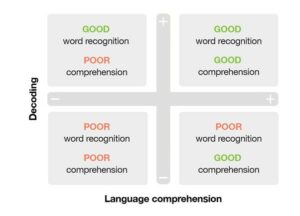
![]()
We know that skilful reading involves two equally important skills- word recognition and language comprehension.
To be successful and fluent readers, children must be given the following two keys:
- Being able to read the words on the page (Word Recognition)
- Understanding what the words and language in the text mean (Language Comprehension)
If a child cannot recognise words on the page accurately and automatically, fluency will be affected, and in turn, reading comprehension will suffer. Likewise, if a child has poor understanding of the meaning of the words, reading comprehension will suffer.
Children who have success with reading comprehension are those who are skilled in both word recognition and language comprehension. Developing fluency is therefore an important aspect of our reading provision as it acts as the bridge to developing understanding.
Pupils have many opportunities across the curriculum to develop their reading skills. Different approaches are used to develop a broad range of skills.
Whole-class, group and 1:1 reading sessions are designed to explicitly develop reading fluency and comprehension for all pupils whilst enjoying a text together.
Reading comprehension can be improved by teaching pupils specific strategies that they can apply both to monitor and overcome barriers to comprehension.
We have identified some core Reading Skills that pupils need to be successful readers. Each skill is represented by the acronym ‘VIPERS’ (see below) to ensure whole school consistency and to engage pupils in the comprehension activities.
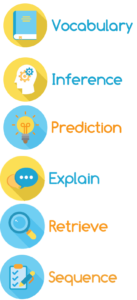
Further information about our Reading provision can be found here.
Writing
English is fully embedded into our E3L themes to provide a wealth of authentic and purposeful opportunities for pupils to develop their literacy skills. There will be a range of inspirational writing opportunities interwoven into our themes from EYFS to Year 6.
Children read a range of high quality texts linked to E3L themes. We have identified the main purposes for writing and organised our curriculum so that we teach text types which share similar features together. For example, the effective use of adjectives can be secured by teaching descriptive poetry and adventure stories during the same half term.
By organising the curriculum in this way, pupils can master the features of each genre much more successfully. Pupils then have multiple chances to apply their skills through the many writing opportunities embedded through the E3L themes.

Speaking and Listening
We firmly believe that a curriculum with a foundation of ‘talk before writing’ will be essential to unlock attainment for our pupils and accelerate their progress. A focus on literacy, and in particular language and vocabulary development, will place our pupils in the best possible position to gain full access to the wider curriculum from the earliest age. We therefore place considerable emphasis on developing pupils’ oral skills and expressive language, focusing on the development of speaking and listening skills. Adults model and scaffold the use of ambitious vocabulary
throughout the school.
The importance of speaking to an audience and presenting work confidently to others, participating in debates and listening, understanding and then responding to others’ points of view are all vital skills for pupils to develop in our school.
Writing Outcomes
We aim to make writing lively and exciting so that we inspire pupils to be imaginative and to develop a love, passion and flair for writing.
Our writing outcomes are linked to our E3L themes to make rich connections across the English curriculum. Teachers support this by providing the children with a variety of high quality texts and engaging yet ambitious activities. Initially the children are immersed in the text, then they are given opportunities to analyse, practise and develop skills before independent application, this includes key grammar and punctuation skills required to write in that genre and allows opportunities for ‘Short Burst’ writing. Children then move onto planning, writing, editing and drafting, finishing with a published extended piece of writing. At all times, the audience and purpose for writing is key and children are encouraged to consider the impact of their writing choices on the reader. We give children many opportunities to write for an authentic purpose and to share their writing with a real audience.
Writing genres are taught using three phases:
- Phase 1 ‘Know it’: Children are immersed in the genre and ‘read as a reader’ to embed words, language features and structures. They explore characters and feelings using drama and role play activities and analyse and ‘unpick’ the features of different text types.
- Phase 2 ‘Try it’: Children are taught the writing skills to be successful in that genre. They ‘read as a writer’ and consider the impact of word choices and sentence structures on the reader. This will include the development of specific spelling, punctuation and grammar skills as well as features of that genre such as descriptive, persuasive or emotive techniques and poetic devices. Teachers carefully model and scaffold writing to support each pupil to develop their writing skills. Pupils are encouraged to experiment with different sentence types and effects.
- Phase 3 ‘Use it’: Children apply the skills and techniques they have learned during the unit to draft, edit, improve and publish their final writing outcome to showcase their independent writing skills.
EYFS and KS1
In EYFS and KS1 the purposes for writing focus on ‘Writing to Entertain’ and ‘Writing to Inform’. We have inspirational writing opportunities interwoven through our themes and pupils get a chance to develop their literacy skills across all aspects of the curriculum. Throughout the EYFS, practitioners value and support all of the Prime areas to ensure strong foundations in writing. In KS1 teachers further support pupils to develop as writers. Teachers immerse children in a range of genres and support them to identify the key features and develop the skills needed to write for a range of purposes and genres. Pupils are supported to be more independent when planning, drafting, and editing their writing and to consider the impact of their choices on the reader.
Pupils write a range of fiction and non-fiction text outcomes, including dinosaur fact files and adventure stories in year 1, and recipes and non-chronological reports in year 2.
KS2
In KS2 English continues to be embedded into our E3L themes to provide a wealth of authentic and purposeful opportunities for pupils to develop their literacy skills. There are a range of inspirational writing opportunities interwoven into our themes.
The four writing purposes that pupils will be taught across KS2 are: ‘Writing to Entertain’, ‘Writing to Inform’, ‘Writing to Persuade’ and ‘Writing to Discuss’. Pupils learn about the features of each genre of writing and then explore and develop the writing skills needed in this genre, before planning, drafting, and editing their own extended writing pieces.
Further information about our Writing provision can be found here.





